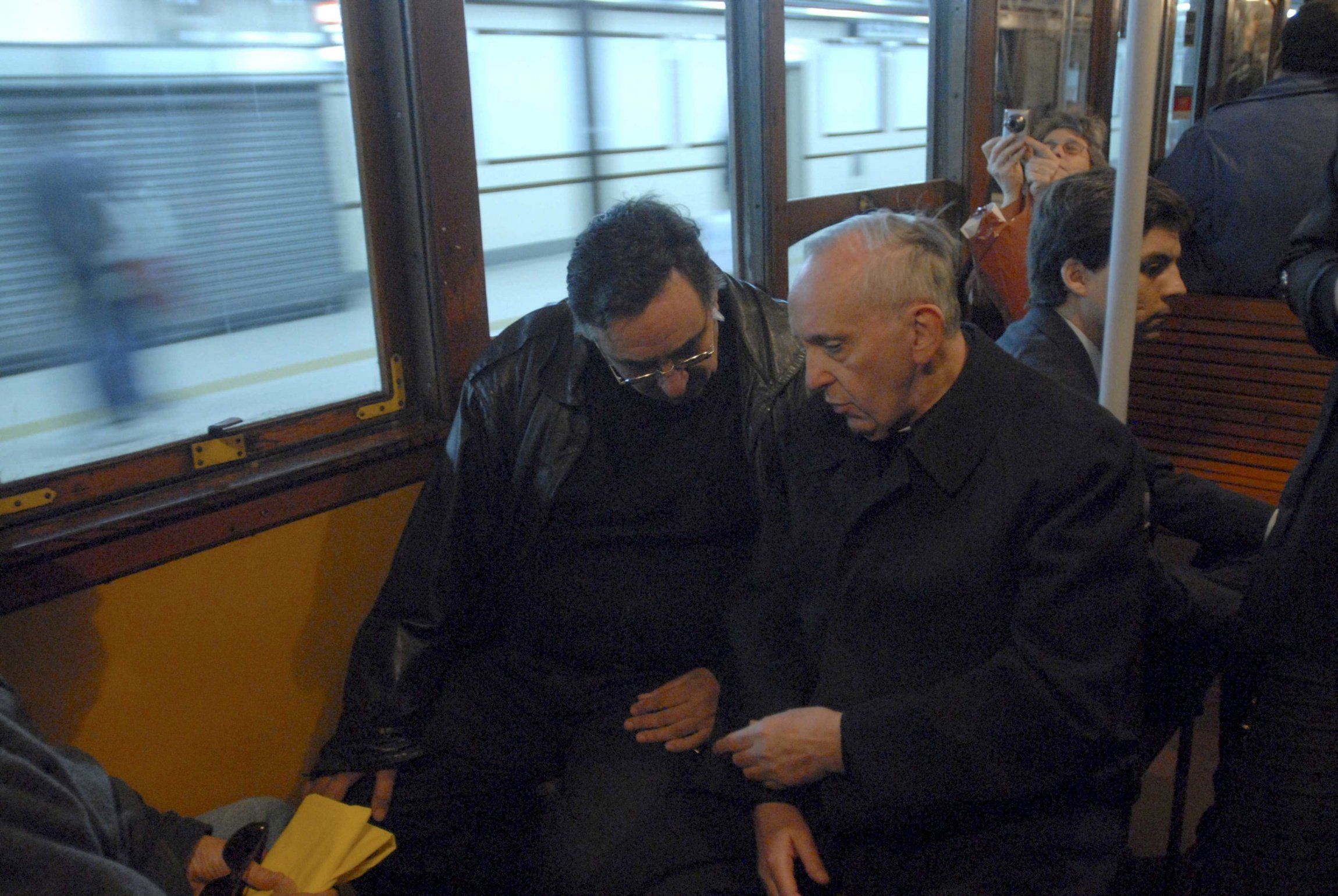By Marie Victoria Nigro
It’s no secret that North America has a car-dominated culture. Cars symbolize many things — status and freedom being two of the most prominent — which could be why public transportation is often overlooked by Catholics in discussions about how to apply Catholic social teaching to their lives.
I have heard cars mentioned in homilies, but have yet to hear one about riding a bus. During a retreat, I heard a cleric say, “You know when you’re stuck in traffic…?” My immediate thought was, “No, because I don’t own a car.” On another occasion, a church that was hosting an event announced, “Due to a lack of parking, we encourage attendees to carpool.” This church is situated on a major bus route, with bus stops right outside its doors, and public transportation wasn’t even listed as an option for getting there.
The late Pope Francis as cardinal archbishop of Buenos Aires used public transportation regularly. He believed in the importance of using the same means of transportation common to the majority of the faithful in his archdiocese. He considered public transit such important aspect of daily life that he mentioned it at least six times in his landmark social encyclical on the environment, “Laudato Si’, on Care for Our Common Home,” which marks its 10th anniversary May 24.
“The quality of life in cities has much to do with systems of transport, which are often a source of much suffering for those who use them,” he wrote. “Many specialists agree on the need to give priority to public transportation. Yet some measures needed will not prove easily acceptable to society unless substantial improvements are made in the systems themselves, which in many cities force people to put up with undignified conditions due to crowding, inconvenience, infrequent service and lack of safety.”
Poor transportation makes cities “unhealthy to live in,” he said. Whereas “great transportation systems” can “produce important means of improving the quality of human life,” he wrote. He also listed “the improvement in public transportation” among the “positive examples of environmental improvement.”
But how often is public transportation brought up in church circles when “Laudato Si’” is discussed? Does the Church care about public transportation?
The answer is yes. If not, the Pontifical Council for Justice and Peace would not have included it in “The Compendium of the Social Doctrine of the Church.” The compendium includes public transit as an essential service in the context of promoting the common good. It states:
“The demands of the common good are dependent on the social conditions of each historical period and are strictly connected to respect for and the integral promotion of the person and his fundamental rights. These demands concern above all the commitment to peace, the organization of the state’s powers, a sound juridical system, the protection of the environment, and the provision of essential services to all, some of which are at the same time human rights: food, housing, work, education and access to culture, transportation, basic health care, the freedom of communication and expression, and the protection of religious freedom.”
Transportation is an essential service and can be considered, at the same time, in the words of the compendium, a human right. It is a basic need for people to get to work or school, to medical appointments, grocery stories and places of worship, in other words, to live daily life and care for themselves and their families. The means of basic transportation in the form of public transit, therefore, is a common good and should be accessible and accessibly priced for all in society, especially for the most vulnerable and poor among us.
As Catholics, we are called to care for the poor. In order to care for them, we also need to get to know them. We need to be where they are. We need to learn about them and their struggles. While not everyone who uses public transportation is poor, using public transit, even occasionally, is a great way to get a different perspective on the region you call home.
Public transportation makes up a significant portion of a municipality’s budget, and is often the subject of debate around council tables. Issues of fiscal responsibility in government should make every citizen realize public transit is an issue they need to pay attention to, even if they never use it.
However, the silence of the Catholic Church in North America on transit issues is deafening. The absence of religious on buses and subways is disheartening. If our spiritual shepherds are quiet and absent, what incentive do their flocks have to change transit and transit accessibility for the better?
One way we can live Catholic social teaching and “Laudato Si’” in a small way is by working toward a day when we have empty parking lots but full churches. By this I mean the faithful will prefer walking, cycling, or using public transit to get to Mass. Take the train to your next conference or visit to a Canadian holy site. Use the bus the next time you go to Mass. Join a transit advocacy group. Write to your local politicians, at all levels of government, about the need for greater transit connectivity across Canada. Let them know that people will not stop driving until public transit is faster, more direct, and more cost-effective in this country.
As a carless-by-choice Canadian, it is frustrating how difficult it is to get to many beautiful places with public means of transportation. Now that the warmer weather has arrived, I would love to spend my weekends exploring the holy sites in Sherbrooke and Salaberry-de-Valleyfield, but I cannot because those destinations are very difficult for me to reach without a car, despite the good road and rail network in Ontario and Quebec. To get to Sherbrooke, I would still have to be routed through Montreal, which is time-consuming and expensive.
To mark the 10th anniversary of “Laudato Si’,” please pray for this important, yet neglected, issue.
Marie Victoria Nigro is a member of Free Transit Ottawa, a public transit advocacy group.





Well-written and argued. I agree we don’t look upon public transportation often enough as a right!